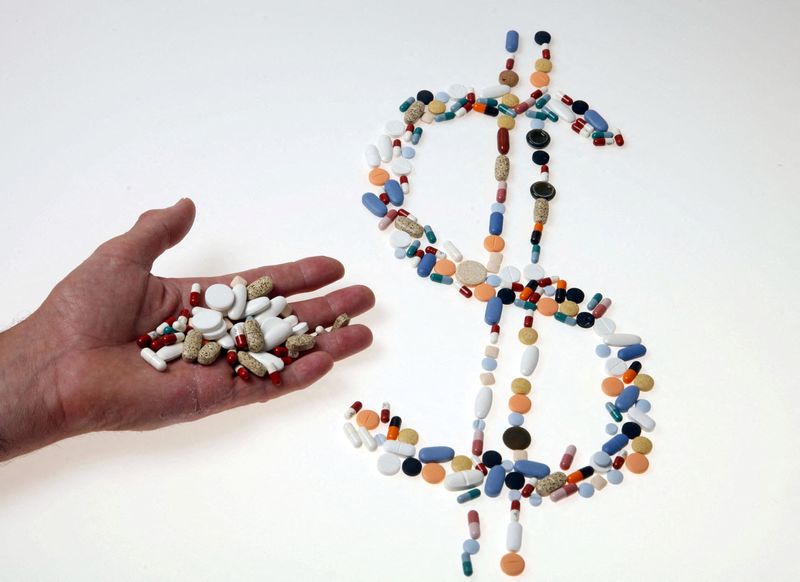Trump looking at cutting US drug prices to international levels

By Patrick Wingrove
(Reuters) -Drugmakers have been warned that the Trump Administration is considering linking U.S. medicine prices to lower amounts paid by other developed countries, according to two company sources who called the option the pharmaceutical industry’s top concern.
Both sources, who were not authorized to speak publicly, said they expected the policy to come from the agency that oversees Medicare and Medicaid health programs.
The first source said he had been told directly by government health officials that they were exploring such a policy, which he described as a mid-level priority for the Trump Administration as it tries to lower drug prices.
The two sources said any such policy was more concerning to the industry than other government moves under discussion, which include tariffs on imported medicines. The first source said it is the biggest “existential threat to the industry and U.S. biosciences innovation.”
Industry trade group PhRMA earlier this year lobbied Congress on the issue, sometimes referred to as international reference pricing, according to government records.
The U.S. pays the most for drugs in the world, often nearly three times that of other developed nations. President Donald Trump has said he wants to close that spread, but has not publicly specified how. In his first term, Trump’s proposed international reference pricing program was blocked by a court.
Trump’s wide-ranging proposal five years ago was projected by his administration to save taxpayers more than $85 billion over seven years, cutting into U.S. annual spending of more than $400 billion on drugs.
“I don’t think the administration fully understands the impact that policy could have on innovation in the U.S.,” said the first source. It will “be disruptive for the entire healthcare market, not just pharmaceuticals.”
He said he expected the Medicare agency to launch a pilot of the program, after health officials said they were looking to test some drug pricing proposals.
The White House, the U.S. Department of Health and Human Services, which oversees Medicare, and PhRMA did not respond to requests for comment.
FOCUS ON MEDICARE
Drug pricing and other pilots are typically run within the Centers for Medicare and Medicaid Services’ innovation center, known as CMMI, and can extend for years to either Medicare, Medicaid or both.
Trump has not publicly raised the idea of reference pricing since taking office, but conservative think tank the America First Policy Institute has. In a widely circulated paper last month it said the policy could be implemented within Medicare’s drug price negotiations.
Former President Joe Biden’s Inflation Reduction Act allows the government to negotiate the price of its costliest drugs. The prices for the first 10 prescription drugs it negotiated were still on average more than double, and in some cases five times, what drugmakers had agreed to in four other high-income countries, Reuters previously reported.
Reference pricing was missing from Trump’s healthcare executive order last week, but one analyst said by directing the government to obtain better value for medicines covered by Medicare, it may have opened the door to the policy.
The Trump administration would face an uphill battle in implementing even a limited proposal, experts said.
Anna Kaltenboeck, a health economist at Verdant Research, said the Centers for Medicare & Medicaid Services only has so many staff and implementing such a policy may require “a fair amount of manpower that (CMS) is going to struggle to muster.”
The Trump administration’s layoff plans for multiple government health agencies included around 300 staff from the Medicare agency of the 10,000 total targeted by Health Secretary Robert F. Kennedy Jr. Another 10,000 have left after taking buyout and early retirement options, HHS has said.
Trump’s government would also face challenges in trying to implement the policy more broadly, said Kaltenboeck.
There are thousands of approved drugs in the U.S., some of which are not covered by or have not been launched in different reference nations, said Rena Conti, an associate professor at Boston University.
Those countries can sometimes take years to negotiate drug prices, she added.
A 2022 JAMA study of nearly 600 new medicines approved in either the U.S. or Germany found that 92% were available in the U.S., while 80% were available in Germany.
Some countries don’t publish what they pay for drugs. Conti said the administration could estimate what they pay based on publicly available data, but without accounting for further discounts those governments negotiated.
Drugmakers could also respond by re-negotiating contracts with reference countries to increase prices, raising the bar for prices in the U.S. and generating higher revenue abroad, Conti suggested.
(Reporting by Patrick Wingrove in New York; Additional reporting by Maggie Fick in London; Editing by Caroline Humer and Bill Berkrot)









